Eating well is Jiu-Jitsu: Food x Anxiety – 3 steps to self-control
It is clinically proven that a large number of people use food to “treat” their anxiety. The vast majority tend to unconsciously attack the refrigerator, often for sweets and carbohydrates in general. Or they spend the whole day nibbling. Hour after hour, they are looking for something to eat …
The result? They do not cure the problem (anxiety) and risk gaining weight or even unhealthily losing it, as some react to anxiety in the opposite way: not eating at all. Would anxiety medication be the best solution? Would we be able to control it? And how?
The first step is recognizing the problem; accepting that we suffer from these crises and then being aware and able to look for alternatives to circumvent it. The second step? Jiu-Jitsu lessons. Yes, the gentle art works with discipline, focus and mental control, and those are essential factors which can help a lot during anxiety attacks. What about the third step? Eating. Believe it or not, there are foods that help us in controlling anxiety as they contain essential vitamins and amino acids, which act directly reducing stress, fighting anxiety and increasing serotonin levels, responsible for the welfare and the relaxation feelings. Today on “Eating well is jiu-jitsu”, you will learn about 7 foods that combat anxiety.
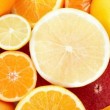 Citrus Fruits: Studies have shown that vitamin C, found in citrus fruits, decreases the secretion of cortisol, a hormone released by the adrenal gland in response to stress and anxiety and responsible for transmitting the “news” about the stress to every part of the body. Its consumption promotes the proper functioning of the nervous system and increases the sense of well-being. “Vitamins and minerals such as vitamin C, for example, are lost during stress and anxiety scenarios, besides the blood sugar decrease (hypoglycemia). Therefore, it’s necessary to fill those needs,” says the nutritionist Rosana Farah, a member of the Brazilian Association for the Study of Obesity.
Citrus Fruits: Studies have shown that vitamin C, found in citrus fruits, decreases the secretion of cortisol, a hormone released by the adrenal gland in response to stress and anxiety and responsible for transmitting the “news” about the stress to every part of the body. Its consumption promotes the proper functioning of the nervous system and increases the sense of well-being. “Vitamins and minerals such as vitamin C, for example, are lost during stress and anxiety scenarios, besides the blood sugar decrease (hypoglycemia). Therefore, it’s necessary to fill those needs,” says the nutritionist Rosana Farah, a member of the Brazilian Association for the Study of Obesity.
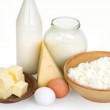 Milk, eggs and lean derivatives: These are great sources of a type of amino acid called tryptophan, which relieves anxiety symptoms. According to Rosana Farah, once present in the brain, the tryptophan increases the production of serotonin – the happiness hormone – a neurotransmitter that helps us to relax and offers that sense of well-being. The expert recommends the consumption of 2 to 3 servings per day of this food group.
Milk, eggs and lean derivatives: These are great sources of a type of amino acid called tryptophan, which relieves anxiety symptoms. According to Rosana Farah, once present in the brain, the tryptophan increases the production of serotonin – the happiness hormone – a neurotransmitter that helps us to relax and offers that sense of well-being. The expert recommends the consumption of 2 to 3 servings per day of this food group.
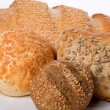 Carbohydrates: The carbohydrates from cereals – simple or the whole ones – and from the most sugary fruits can also combat undesired anxiety. “They raise the level of sugar in blood, providing energy, wellness and disposition”, explains Rosana Farah. Breads, rice, oats, beans, pasta, potatoes, honey, jabuticaba, grapes and apples are part of this food group. The recommended amount is 6 to 9 daily servings.
Carbohydrates: The carbohydrates from cereals – simple or the whole ones – and from the most sugary fruits can also combat undesired anxiety. “They raise the level of sugar in blood, providing energy, wellness and disposition”, explains Rosana Farah. Breads, rice, oats, beans, pasta, potatoes, honey, jabuticaba, grapes and apples are part of this food group. The recommended amount is 6 to 9 daily servings.
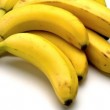 Banana: A study by the members of the Institute of Food and Nutrition Research in the Philippines found that this fruit helps in fighting depression and relieves the symptoms of anxiety. That’s thanks to the high content of tryptophan that banana carries, helping in the serotonin production.
Banana: A study by the members of the Institute of Food and Nutrition Research in the Philippines found that this fruit helps in fighting depression and relieves the symptoms of anxiety. That’s thanks to the high content of tryptophan that banana carries, helping in the serotonin production.
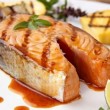 Meat and fish: They are the best natural source of tryptophan, an amino acid that when combined with vitamin B3 and magnesium produces serotonin, an important neurotransmitter for the sleeping process, mood, and anxiety levels regulation. Furthermore, meat and fish contain another amino acid called taurine. This substance increases the availability of a neurotransmitter called GABA, used by the body to physiologically control the anxiety. “The daily amount recommended for meat is 1-2 servings. Always prefer white and lean meats,” advises the nutritionist Rosana Farah.
Meat and fish: They are the best natural source of tryptophan, an amino acid that when combined with vitamin B3 and magnesium produces serotonin, an important neurotransmitter for the sleeping process, mood, and anxiety levels regulation. Furthermore, meat and fish contain another amino acid called taurine. This substance increases the availability of a neurotransmitter called GABA, used by the body to physiologically control the anxiety. “The daily amount recommended for meat is 1-2 servings. Always prefer white and lean meats,” advises the nutritionist Rosana Farah.
 Chocolate: “The chocolate is high in flavonoids, a type of antioxidant that stimulates the production of serotonin, a neurotransmitter responsible for the well-being feeling and mood improvement. It also reduces the anxiety,” explains Rosana Farah, expert in clinical and gastronomy nutrition. The recommended is 30 grams of chocolate per day. Prefer the dark chocolate, which is much less caloric and contains more flavonoids.
Chocolate: “The chocolate is high in flavonoids, a type of antioxidant that stimulates the production of serotonin, a neurotransmitter responsible for the well-being feeling and mood improvement. It also reduces the anxiety,” explains Rosana Farah, expert in clinical and gastronomy nutrition. The recommended is 30 grams of chocolate per day. Prefer the dark chocolate, which is much less caloric and contains more flavonoids.
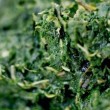 Spinach: Spinach contains folate (folic acid), a potent natural antidepressant vitamin. According to Rosana Farah, it fights anxiety because when this acid’s level is low in the body, it also decreases brain levels of serotonin. Furthermore, according to a study by the University of California, the brain consumes a lot of energy to work and this results in some oxidant chemical substances as “leftovers”. At this point some foods, such as spinach, start working to eliminate those substances in excess, “derusting” the brain.
Spinach: Spinach contains folate (folic acid), a potent natural antidepressant vitamin. According to Rosana Farah, it fights anxiety because when this acid’s level is low in the body, it also decreases brain levels of serotonin. Furthermore, according to a study by the University of California, the brain consumes a lot of energy to work and this results in some oxidant chemical substances as “leftovers”. At this point some foods, such as spinach, start working to eliminate those substances in excess, “derusting” the brain.
This article has only an informative purpose and is not intended to replace professional guidance. The use of vitamins and supplements can offer you great results, but before using any product, we strongly recommend you to visit a Nutritionist, Doctor, or another specialist for an analysis and follow-up.
Source (in Portuguese): Minha Vida
Images: Google

